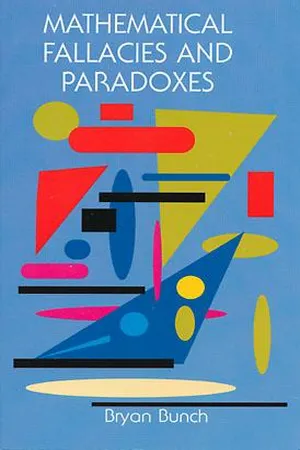
- 240 pages
- English
- ePUB (mobile friendly)
- Available on iOS & Android
Mathematical Fallacies and Paradoxes
About this book
From ancient Greek mathematics to 20th-century quantum theory, paradoxes, fallacies and other intellectual inconsistencies have long puzzled and intrigued the mind of man. This stimulating, thought-provoking compilation collects and analyzes the most interesting paradoxes and fallacies from mathematics, logic, physics and language.
While focusing primarily on mathematical issues of the 20th century (notably Godel's theorem of 1931 and decision problems in general), the work takes a look as well at the mind-bending formulations of such brilliant men as Galileo, Leibniz, Georg Cantor and Lewis Carroll ― and describes them in readily accessible detail. Readers will find themselves engrossed in delightful elucidations of methods for misunderstanding the real world by experiment (Aristotle's Circle paradox), being led astray by algebra (De Morgan's paradox), failing to comprehend real events through logic (the Swedish Civil Defense Exercise paradox), mistaking infinity (Euler's paradox), understanding how chance ceases to work in the real world (the Petersburg paradox) and other puzzling problems. Some high school algebra and geometry is assumed; any other math needed is developed in the text. Entertaining and mind-expanding, this volume will appeal to anyone looking for challenging mental exercises.
Tools to learn more effectively

Saving Books

Keyword Search

Annotating Text

Listen to it instead
Information
1
Thinking Wrong about Easy Ideas


SEEING IS BELIEVING
Table of contents
- Title Page
- Copyright Page
- Dedication
- Preface
- Table of Contents
- 1 - Thinking Wrong about Easy Ideas
- 2 - Thinking Wrong about Infinity
- 3 - Using a Wrong Idea to Find Truth
- 4 - Speaking with Forked Tongue
- 5 - Paradoxes That Count
- 6 - The Limits of Thought?
- 7 - Misunderstanding Space and Time
- 8 - Moving Against Infinity
- Selected Further Reading
- Index
Frequently asked questions
- Essential is ideal for learners and professionals who enjoy exploring a wide range of subjects. Access the Essential Library with 800,000+ trusted titles and best-sellers across business, personal growth, and the humanities. Includes unlimited reading time and Standard Read Aloud voice.
- Complete: Perfect for advanced learners and researchers needing full, unrestricted access. Unlock 1.4M+ books across hundreds of subjects, including academic and specialized titles. The Complete Plan also includes advanced features like Premium Read Aloud and Research Assistant.
Please note we cannot support devices running on iOS 13 and Android 7 or earlier. Learn more about using the app